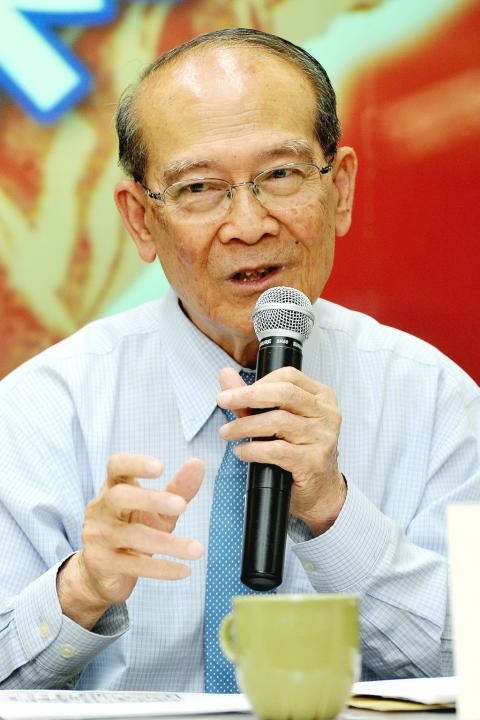|
Huang Tien-lin warns
on Ma’s cross-strait policy
TIES THAT BIND: The former Presidential Office
adviser said if Taiwan continued cross-strait integration, it would not be able
to leave, and that it only masked unification
By Lin Shih-ping and Jake Chung / Staff reporter, with staff
writer

Former presidential adviser Huang
Tien-lin is pictured in July.
Photo: Chien Jung-fong, Taipei Times
Former Presidential Office adviser Huang
Tien-lin (黃天麟) earlier this week criticized the regional integration policies of
President Ma Ying-jeou’s (馬英九) administration, warning that should the Ma
government enter into the “one China” framework, there would be no backing out.
Huang said the relaxation of financial regulations on both sides of the Taiwan
Strait, as well as allowing the yuan for foreign currency savings, has caused
the silent migration of core assets within the financial sector from Taiwan to
China.
That not only constitutes a financial threat to Taiwan, but also adds to the
unequal distribution of wealth within the nation, Huang said, adding that
Taiwanese were suffering from the silent migration, while foreigners were
benefiting.
Huang also said the cross-strait trade service agreement allowing banks from
Taiwan to set up branches in China’s Fujian Province was a trap, saying that it
was limiting Taiwan’s banking industry to Fujian and would only lead to internal
competition.
“Taiwan’s economy needs to become more internationalized instead of becoming
increasingly locked into the Chinese market,” Huang said.
Huang said the amount of Taiwanese funds open with exposure to China now
amounted to NT$30.8 billion (US$1 billion), adding that Taiwan was the country
most at risk in the event of a financial crisis in China.
“Continued investment in China is unhealthy for Taiwan’s economic and trade
development,” he said.
Huang said that the Ma administration should put a temporary freeze on the
cross-strait trade service agreement and focus on securing Taiwan’s place in the
Trans-Pacific Partnership (TPP) first.
“If we pick up trade negotiations with China after joining the TPP, we will not
become marginalized in regional integration, but if we were to ratify the
cross-strait trade service agreement first, China would only become more
emboldened in its efforts to block Taiwan from joining the TPP,” he said.
Vice Minister of Economic Affairs Bill Cho (卓士昭) said in response to Huang’s
comments that regional economic integration went side-by-side with the
government’s policy.
Prior to 2008, the policy had been to enter Chinese markets, as many Western
countries were doing, but since 2008, it has has been to use China as a
springboard to diversify the nation’s trading partners, Cho said.
The Economic Cooperation Framework Agreement (ECFA) was signed in 2010 in
accordance with this policy, Cho said.
Cho said that Taiwan had signed four free-trade agreements (FTA) prior to 2008,
but they had accounted for less than 1 percent of Taiwan’s total foreign trade.
However, after signing the ECFA with China and agreements with Singapore and New
Zealand, there had been an increase in trade volume, Cho said
[Editors’ note: The pact with Singapore has not yet been signed].
However, Huang responded that the amount of trade between Taiwan, New Zealand
and Singapore was still miniscule, adding that the only reason Taiwan had been
able to sign an FTA with New Zealand was that China did not block it.
“If Taiwan continues to cozy up to China and becomes more integrated with it, it
will not be able to leave,” he said, adding that “Ma’s ‘China first, the
international community later’ rhetoric was only a disguise for ultimate
unification with China, which he is just afraid of mentioning out loud.”
|
![]()
![]()
![]()